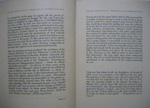PETER KROPOTKIN: TRIBUTES & APPRECIATIONS
he watched the whole range of organic life for proofs of mutual aid as against the struggle for life, and I saw him
seldom so delighted as some afternoon in the British Museum when, at last, he had just discovered an account of early
social tigers which a scientist had declared not to exist, meaning thereby to strike a nasty blow against mutual aid.
Kropotkin by accident found an account that tigers also had lived in small herds until the persecutions of men reduced
their numbers and forced them to isolate themselves in remote parts of the jungle. To this observation of the the details
of animal and social life he added by and by to the burden of ethical research, where so much literature antagonistic to
his ideas still required to be examined preliminarily.
Then his American journey produced the invitation of the "Atlantic Monthly" to write his "Memoirs," a task the first
part of which revived all his early Russion memories and, in general, led him back to ever so many recollections of which
he did not speak in the "Memoirs." Knowing my historical and bibliographical interest - which he always very kindly
esconded - he told me in those years many additions to the "Memoirs" which I found useful for my additional notes on
Bakunin and the life of Malatesa or which, if they concern the last years of the International and Anarchism of the
eighties, repose still in my notes. This period of personal retrospection was interrupted by the greater interest
which Russia claimed from him when at last in the years receding 1905 the movement became more hopeful and some said:
now or never! and the change of 1905 was brought about indeed. In those years Kropotkin visited America another time
and gave those lectures which the book "Russian Literature" (1905) reproduces.
* * * * * * * * * * * * * *
[ Page 16 ]
During the last few years before 1914 he felt very much the necesity of always having to work to keep his home going,
and he would have dearly enjoyed some real rest, which for him would have meant the reading and even the collecting of
books (for he was a book lover, too and enjoyed getting hold of scarce revolutionary editions,) artistic pleasures, and
listening to interesting news, with soome peeps behind the curtains of politics among them which he dearly loved. But
such leisure he was never to enjoy; some cares, impaired working power and very precarious health never gave him a long
respite; it was painful to see how often work, overwork, downbreak and enforced rest succeeded each other almost automatically.
Yet he was cheerful and gay and loved to joke and to laugh, but he was also the next moment dreadfully hard and earnest, and,
above all, he was unalterable in his adherence to the different sorts of ideas which he had formulated. But why insist upon
some weaknesses which, after all, no doubt had their advantages as well, and contributed to the composition of the unique
personality he was.
* * * * * * * * * * * * * *
I last saw him before he left for bordighera at the end of 1913. I was not surprised at his attitude on the war, since
his opinions on this subject were old and deep rooted. I can thus feel and understand his life from 1914 to 1917, also his
immense delight at the Russian Revolution of March, 1917, and the hope with which he returned to Russia in Kerensky's time.
Some months later however, his life must have become a tragedy, and must have been this to the very end. Tolstoy spoke up to
the Tsar in 1908: "I can no longer be slient; I must speak!" - Kropotkin's voice to...
[ Page 17 ]
|

|